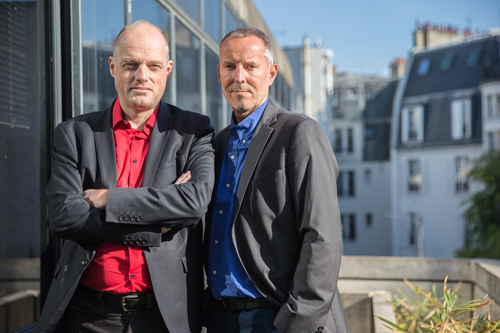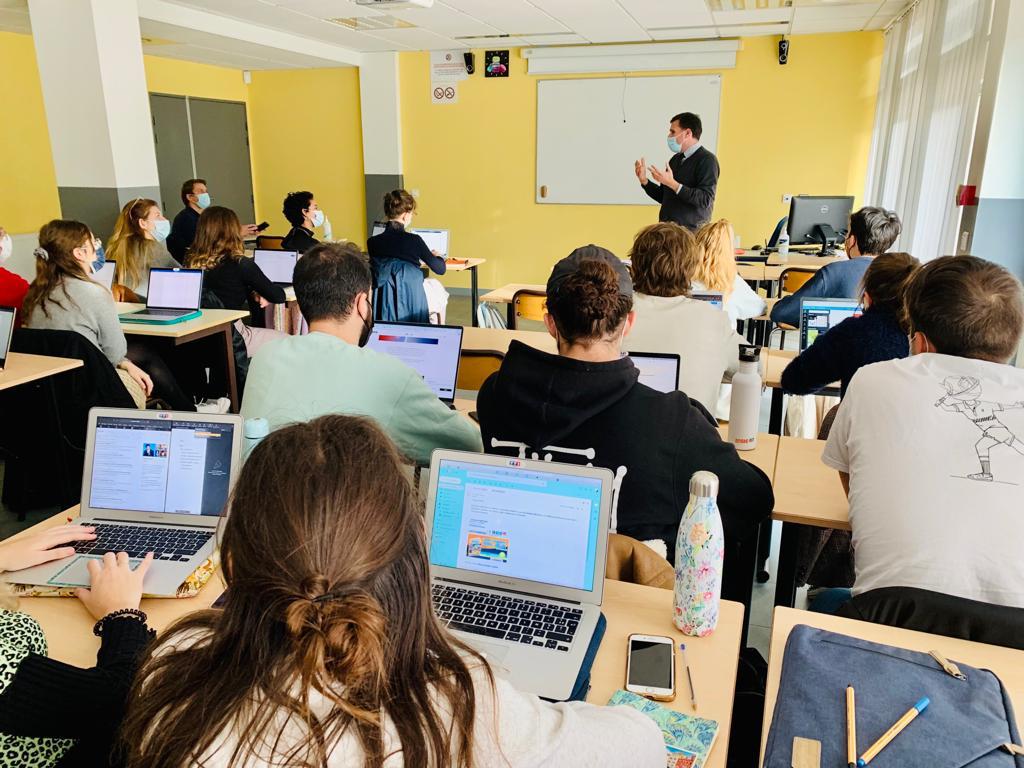2021-2022
-
June 23, 2022, Territorial Knowledge Conference: "Living and working in the city center at a time of health crisis"
 nouvo-logo-connaissance-du-territoire-carre_2.png
nouvo-logo-connaissance-du-territoire-carre_2.pngConfinements, teleworking, distancing measures, travel restrictions... All these measures, painful for everyone, have been experienced differently depending on where one lives. Questions about the future of cities have fuelled two years of crisis and debate. Numerous reports have shown city dwellers who, tired of their too-small apartments and their too-mineral neighborhoods, have left the city to work in the countryside.
But not all city dwellers have left, either by choice or by constraint. A large majority of urban dwellers in the region have adapted, by developing new uses in the private sphere (adaptation of housing), as well as in the public space (local sports practices, changes in travel patterns, etc.). In terms of urban planning, cities have organized themselves in an emergency (corona-tracks for bicycles, gymnasiums transformed into vaccination centers, etc.) and are emerging from a crisis that has shaken certainties, such as the validity of density and the mono-functionality of housing...
One of the major impacts observed is the digitization of economic activities and a new relationship to proximity. In the end, will the Covid be, like the great epidemics in history, an accelerator of urban mutations?
On the agenda of this meeting:
- During this new Connaissance du Territoire meeting, moderated by Alexandre Joux, we will present two studies that we will be analysed by our main witness Hélène Reigner, professor of urban planning and development at Aix-Marseille University, member of the scientific council of the Southern Region and head of Popsu Territoires (a research-action program that aims to mobilize the world of research to shed light on public action in small towns and rural territories).
- Emilie Collignon, in charge of commercial urban planning at the CCI Côte d'Azur, will present an overview of the economic activity located in city centers. This analysis is the result of a partnership between the Southern Region, the CCIR, the CMAR and the EPF on the 118 town centers of the SRADDET
- Laurent Couture, Head of Economic Spaces and Commercial Urban Planning at the Marseille Urban Planning Agency (AGAM), will present the prospective work initiated by the Region, in partnership with the Network of Regional Urban Planning Agencies, to understand what has happened since the beginning of the health crisis and to try to imagine possible trajectories.
The presentations is followed by a debate with the participants.
Listen to the podcasts realised by the students of EJCAM
- Hélène Reigner, professor of urban planning and development at Aix-Marseille University, member of the scientific council of the Southern Region and head of Popsu Territoires
- Entretien avec Emilie Collignon, in charge of commercial urban planning at the CCI Côte d'Azur
- Laurent Couture,Head of Economic Spaces and Commercial Urban Planning at the Marseille Urban Planning Agency
-
March 10, 2022, Territorial Knowledge Conference: "What development opportunities for mountain resorts faced with climate change?"
 nouvo-logo-connaissance-du-territoire-carre_2.png
nouvo-logo-connaissance-du-territoire-carre_2.pngThe Alps, the second largest mountain range in France, represents 65% of the territory of the Provence-Alpes-Côte d'Azur region and 15% of its inhabitants. It has a remarkable diversity of landscapes, and a great environmental wealth, where anthropized and natural spaces intersect.
With 65 ski resorts, 2,500 kilometers of downhill ski trails and 1,200 kilometers of cross-country ski trails and more than 700 ski lifts, the mountain resorts of the Southern Alps are the driving force behind tourism and structure the economy of the Alpine territories. It is an economic space marked by agriculture and winter and summer tourism, attractive and fragile at the same time.
Today, these territories must face a certain number of societal changes and economic difficulties linked to the climate crisis, which tend to accentuate their fragility.
What are the climate projections in terms of snowfall for our regional resorts? What are the levers and axes of development for mountain territories, with regard to the changing needs of customers, the impact of climate change and their financial capacities?
- Nils Ginestou, head of the mountain department of the Southern Region, presented a prospective study on the future of the Southern Alps resorts, which highlights the challenges of the economic and tourism model of the resorts by 2030-2050. This study proposes a climatic, snow and energy model for the resorts of the Southern Alps, and presents an analysis of the financial, economic and tourism model of ski areas.
- Bernard Pecqueur, our guest speaker, has a doctorate in economics and a degree in political science. He is a professor at the Institute of Alpine Geography at Grenoble Alpes University. He has also worked as a parliamentary assistant (1981-1983) and was elected to the Grenoble City Council. His research focuses on local and territorial development and the modalities of territorial governance. He has developed the notion of "territorial resources" as an element of collective development strategy. He has published numerous articles and books on territorial dynamics.
The meetings were moderated by Alexandre Joux, Full Professor at EJCAM.
-
January 20, 2022, Conference: The last investigation of Gérard Davet and Fabrice Lhomme
 Gérard Davet and Fabrice Lhomme (photo credit Vincent Chapman)
Gérard Davet and Fabrice Lhomme (photo credit Vincent Chapman)January 20, 2022, Conference: "The last investigation of Gérard Davet and Fabrice Lhomme
Gérard Davet and Fabrice Lhomme, senior reporters at Le Monde newspaper, came to present their book " Le traître et le néant, Macron l'Enquête " (Éditions Fayard, 2021) on January 20, 2022, at EJCAM, Marseille site. They also had a long discussion with the students. The meeting was rich in exchanges and included feedback on investigative journalism, punctuated by anecdotes and advice.
Aix-Marseille University (AMU) follows CNIL guidelines
The platform that broadcasts this content conditions its reading to the deposit of tracers in order to offer you targeted advertising according to your navigation.
By clicking on 'I authorize', the cookies will be deposited and you will be able to view this content.
I authorizeConference Gérard Davet and Fabrice Lhomme EJCAM 20 January 2022 -
December 08, 2021, Conference: "The mission of the U.S. Embassy in France and the role of the spokesperson" by Jared Caplan
 img-20211208-wa0002.jpg
img-20211208-wa0002.jpgDecember 8, 2021, Lecture: "The Mission of the U.S. Embassy in France and the Role of the Spokesperson" by Jared Caplan
Jared Caplan is the spokesperson for the U.S. Mission to France. He joined the U.S. Foreign Service in 2004 and has worked in Kuwait, Saudi Arabia, Libya, the United Arab Emirates, the United Kingdom, Afghanistan and now France. For seven years, he served as the State Department's Arabic language spokesperson and as the Department's acting deputy spokesperson in Washington, D.C. Jared Caplan is a native of Boca Raton, Florida, and studied international politics at Georgetown University and political communication at the London School of Economics. He first came to France as an exchange student and is delighted to be back and working in the interest of strong bilateral ties between France and the United States.
-
December 02, 2021, Territorial Knowledge Conference "Frontline workers facing the Covid Crisis: the current situation and issues"
 nouvo-logo-connaissance-du-territoire-carre_2.png
nouvo-logo-connaissance-du-territoire-carre_2.pngThe health crisis and, in particular, the first episode of lockdown have highlighted a category of essential jobs, known as "front-line" jobs. Some professions that are often devalued have emerged as essential to the proper functioning, or even the survival, of our society.
The whole sector of personal services, which is called the care economy, appears to be indispensable: behind the checkout counters in supermarkets, in day care centers that are still open, in private homes, or even to ensure cleaning in hospitals and supermarkets, we cannot do without a host of male and female workers, often behind the scenes, who are not given much attention in "normal" times. Combining difficult working conditions, low wages and job insecurity (short contracts, part-time work), these workers are mostly women in very gendered jobs.
The meeting took stock of the jobs and social conditions of these workers in Provence-Alpes-Côte d'Azur before putting into perspective the challenges they face, through two successive presentations by:
- Olivier Sanzeri (INSEE) and Virginie Meyer (DREETS), presented a study conducted with the Region highlighting the preponderance of women among the 392,300 workers on the front line during the first wave of the Covid-19 epidemic
- Pierre Concialdi, an economist specializing in social issues and a researcher at the "Institut de Recherches Économiques et Sociales" (IRES) was our main witness.
View/listen to podcasts and videos made by EJCAM students
-
November 26, 2021, Conference "The Pornographed Planet: What Effects on Individuals and Society? "
 vignette_0.png
vignette_0.pngIn the framework of the undergraduate degree (3rd year) Information Communication, a group of students has created the student association Let's Talk. It organized a conference entitled :
The pornographed planet: what effects on individuals and society?
Two speakers, experts in the field of media images, especially "eroticized" and their influence on individuals and society :
- Esther Loubradou, Doctor in Information and Communication Sciences and author of the book: "La pub enlève le bas: sexualisation de la culture & séduction publicitaire" (reference: LOUBRADOU Esther (2015), La pub enlève le bas. Sexualisation de la culture & séduction publicitaire, Paris, Éditions Le Bord de l'eau, Coll. " Penser les médias ")
- Didier Courbet, University Professor in Information and Communication Sciences at Aix-Marseille University, co-author of the book "Connectés et heureux. Du stress digital au bien-être numérique" (reference: FOURQUET-COURBET Marie-Pierre, COURBET Didier (2020). Connectés et heureux ! Du stress digital au bien-être numérique. Paris : Dunod)
Vidéo : Partie 1Vidéo : Partie 2 -
September 09, 2021, Territorial Knowledge Conference "Tourism development and access to housing: What are the issues for our territories?"
 nouvo-logo-connaissance-du-territoire-carre_2.png
nouvo-logo-connaissance-du-territoire-carre_2.pngA real support for a dynamic tourist economy, thanks to the financial spin-offs they generate locally, secondary residences also contribute to the tension of the real estate market, by revealing the difficulties of access to housing for certain populations, forced to move away to access affordable housing.
The Provence-Alpes-Côte d'Azur region is strongly impacted by the development of secondary residences, which account for nearly 14.5% of all housing units, placing it second only to Occitania. At the same time, the emergence of new players in the real estate market is creating new opportunities for second homes, as new residential tourism practices are being introduced in the region, linked to the growth of seasonal rental platforms.
From then on, it is appropriate to take the measure of their dynamics that is intensifying, thus offering insight into the issues of planning and balanced development of the regions' territories.
The speakers:
- Benjamin Mereau, Head of Regional Action Projects, Insee Provence Alpes-Côte d'Azur Regional Directorate, presented the study " Who owns second homes? "
- Sylvie Rochhia, economist at the Groupe de Recherche en Droit, Économie et Gestion (GREDEG), and Jean-Charles Briquet-Laugier, General Secretary of the Maison des Sciences de l'Homme et de la Société Sud-Est, presented the study "Airbnb in Provence-Alpes-Côte d'Azur: a new player for the tourism economy"
- Mathis Stock, a geographer specializing in tourism at the University of Lausanne, and a member of the Cultures and Natures of Tourism Research Group, was our Main Witness.
View/listen to podcasts and videos made by EJCAM students
- Benjamin Mereau, Head of Regional Action Projects, INSEE Provence Alpes-Côte d'Azur Regional Directorate, is interviewed by Laure Lemeille
- Mathis Stock, a geographer specializing in tourism at the University of Lausanne, and a member of the Cultures and Nature of Tourism research group, is interviewed by Capucine Lalanet
